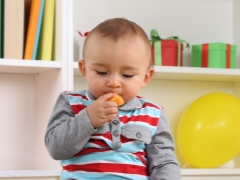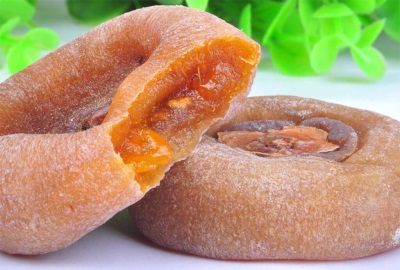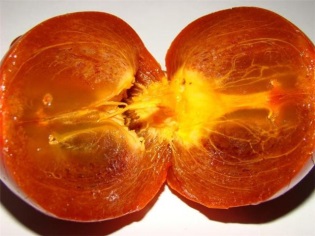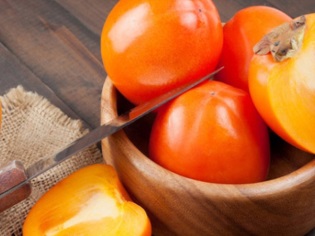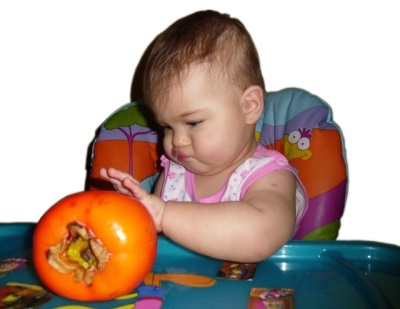At what age can a child be given a persimmon?
Sweet and fragrant persimmon fruits are popular with many adults, but can they be given to young children? In order not to harm the health of the baby, before giving her a crumb, parents should learn more about the features of this fruit, the optimal age of introduction to the children's diet and other important nuances.
Benefit
- Persimmon is a source of carbohydrates, organic acids, natural fiber, tannins and many other useful compounds.
- This fruit will replenish the diet with minerals and vitamins in the winter.
- Its use has a positive effect on the work of the thyroid gland, the condition of the vascular walls, the work of the kidneys and the immunity of the child.
- Due to the high content of vitamin A in the form of beta-carotene, it is important for the growth processes in the children's body and to maintain good vision.
- It contains a lot of iron, potassium, iodine, magnesium, calcium, manganese and other elements.
- This fruit is rich in vitamin C and rutin, so drinking affects vessels, immune defense and blood condition.
- The presence of natural sugars in the composition makes it useful for brain activity and performance.
- The fruit has a fixative effect, so it helps to get rid of diarrhea.
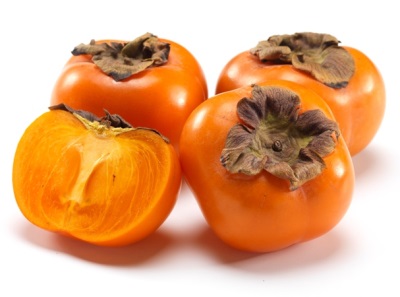
Minuses
- Due to its astringent properties, if introduced too early into the infant diet can cause bowel obstruction.
- Excessive consumption leads to constipation, especially if the fruits are not mature enough (they are rich in tannin). This property causes a ban on the use of persimmon in the case when the child has a tendency to constipation.
- It belongs to a fairly strong allergens, so the reaction to its introduction into the children's diet are quite common. This is the reason to acquaint the baby with the fruit gradually, offering first a small piece of fruit in the morning.
- Because of the large amount of easily digestible carbohydrates, it is contraindicated in diabetes.
- The simultaneous use of persimmon and milk causes diarrhea.
You will learn more about the benefits and harms of this fruit from the “Live Healthy” program.
From how many months can you put in feed?
Most experts advise to include such a fruit in the diet of children not younger than three years of age, when the digestive system is ripe enough for normal digestion.
Some parents risk treating her with the sweet flesh of a child of 1-2 years, but every mother should understand that the decision to give a persimmon to a child under 3 can end up with problems with the digestive tract. If your baby already has gastrointestinal tract pathology, it is not worth giving him fruit until five years of age.
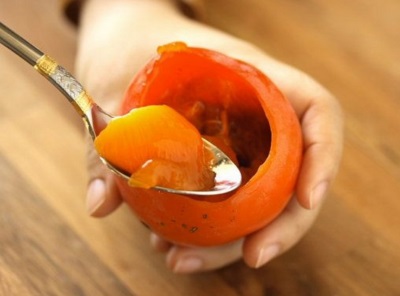
In what form to give?
Most often, persimmon is given to a child fresh, cutting the fruit into slices and peeling it from the peel. Also from this fruit you can cook jelly, fruit salads and various desserts. It can be a filling for pancakes, sweet casseroles or pies.
Often, children are offered and dried persimmon.Although it reduces the content of vitamins during drying, the product prepared in this way has a lower astringent effect.
Tips for choosing
What to do if you are allergic?
Due to the presence in the composition of a fairly large amount of beta-carotene, causing a bright orange color of the fruit, such fruits are often the cause of an allergic reaction. Already after one or two servings of a child, a rash, redness, runny nose, swelling in the face, a cough or some other symptom of allergy may appear.
In such a situation, the introduction of persimmon in the diet of the baby is stopped and they turn to a doctor so that he advises an antihistamine preparation that is suitable for age.
